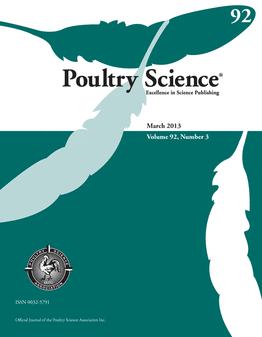
POULTRY SCIENCE
Scope & Guideline
Advancing avian knowledge for a sustainable future.
Introduction
Aims and Scopes
- Poultry Nutrition and Feed Efficiency:
Research on dietary formulations, feed additives, and nutritional strategies to optimize growth, production performance, and health in poultry species. - Animal Welfare and Behavior:
Studies examining the impacts of housing, management practices, and environmental factors on the welfare and behavioral patterns of poultry. - Disease Management and Health:
Investigations into the epidemiology, prevention, and treatment of poultry diseases, including antimicrobial resistance and vaccine efficacy. - Production Systems and Economics:
Analysis of different poultry production systems, their economic viability, and their impacts on sustainability and environmental factors. - Meat and Egg Quality:
Research focused on the factors influencing the quality of poultry products, including meat and eggs, and methods to enhance their nutritional value. - Genetics and Breeding:
Studies on genetic traits related to growth, reproduction, disease resistance, and overall performance in poultry species.
Trending and Emerging
- Sustainable Practices and Environmental Impact:
Increasing research on sustainable poultry production practices, including waste management, carbon footprint reduction, and the use of alternative feed sources. - Innovative Feed Additives and Nutritional Strategies:
Growing interest in the use of phytobiotics, probiotics, and enzyme supplements to enhance feed efficiency and improve gut health in poultry. - Impact of Climate Change:
Emerging studies addressing the effects of climate change on poultry production, including heat stress management and adaptation strategies. - Technological Advancements in Poultry Management:
Research on the application of technology, such as machine learning and imaging techniques, for monitoring health, optimizing feeding, and improving production outcomes. - Animal Welfare and Behavior Studies:
Increased focus on animal welfare, including studies on stress reduction, behavior under different housing conditions, and the impact of management practices on poultry well-being.
Declining or Waning
- Traditional Antibiotic Use:
Research on the use of traditional antibiotics in poultry diets has declined, reflecting a broader industry shift towards antibiotic-free practices and the exploration of alternative health management strategies. - Conventional Housing Systems:
Studies focusing on conventional caged systems are becoming less prevalent as the industry moves towards more humane and sustainable practices, such as free-range and enriched housing. - Generalized Disease Studies:
Broad studies on poultry diseases without specific focus on emerging pathogens or innovative management practices are appearing less frequently, as there is a trend towards targeted research on specific diseases and their control.
Similar Journals

CANADIAN JOURNAL OF ANIMAL SCIENCE
Fostering Collaboration in Animal Science ResearchCanadian Journal of Animal Science, published by Canadian Science Publishing, stands as a pivotal platform in the fields of Animal Science and Zoology, reflecting its commitment to advancing knowledge and research in these crucial areas. Operating since 1975, with dedicated publication since 1993, this journal boasts an impactful history and has established itself within the academic community, holding a 2023 Q2 category rank in Animal Science and Zoology, and a Q3 rank in Food Animals. With its ISSN 0008-3984 and E-ISSN 1918-1825, the journal is accessible to a wide audience, promoting collaboration and the dissemination of innovation across borders. Although not an open-access journal, its valuable insights and research findings serve as essential resources for researchers, professionals, and students striving to enhance their understanding of animal science, veterinary studies, and agricultural practices. As the field of animal science continues to evolve, the Canadian Journal of Animal Science remains a vibrant and influential part of this dynamic landscape.
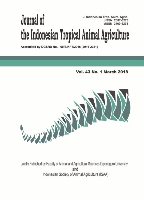
Journal of the Indonesian Tropical Animal Agriculture
Bridging Local Insights with Global Animal ScienceJournal of the Indonesian Tropical Animal Agriculture is an esteemed peer-reviewed journal published by UNIV DIPONEGORO, focusing on the dynamic fields of animal science and veterinary medicine. Since its inception in 2009, the journal has maintained an open access policy, ensuring that valuable research is freely available to the global scientific community. Based in Indonesia, the journal has adapted to the evolving agricultural landscape and now contributes significantly to both local and international discourse on tropical animal husbandry. With a Scopus rank placing it within the 36th percentile for general veterinary sciences and the 25th percentile for animal science and zoology, it is emerging as a valuable resource for researchers and professionals alike. The journal covers a broad range of topics within its scope, fostering innovative approaches and solutions tailored to the unique challenges of the tropical environment. By exploring critical issues in animal agriculture, this journal not only enhances academic knowledge but also supports sustainable practices within the industry. We invite researchers, students, and professionals in the realm of veterinary science and animal agriculture to engage with the rich array of research presented in this journal.
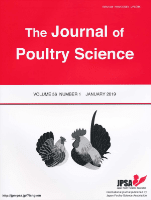
JOURNAL OF POULTRY SCIENCE
Transforming poultry practices with cutting-edge research.JOURNAL OF POULTRY SCIENCE, published by the Japan Poultry Science Association, stands as a pivotal resource in the field of avian research. With an impressive Q2 ranking in the Animal Science and Zoology category and a respectable Scopus percentile of 67, this journal offers a platform for the dissemination of groundbreaking studies and innovations in poultry science. Operating without an open-access policy, it serves as an essential conduit of knowledge for researchers, professionals, and students alike who are engaged in the study and management of poultry. Covering a wide array of topics within the converged years from 2001 to 2024, the journal is committed to advancing the understanding of poultry and enhancing practices in the industry, thereby contributing significantly to agricultural and biological sciences at a global scale. Located in Tsukuba, Japan, it not only fosters collaboration within the community but also encourages high-impact research that shapes the future of poultry science.

Italian Journal of Animal Science
Enriching the dialogue in zoology and animal nutrition.Italian Journal of Animal Science (ISSN: 1594-4077; E-ISSN: 1828-051X), published by Taylor & Francis Ltd, serves as a pivotal platform for the dissemination of cutting-edge research in the fields of animal science and zoology. Since its transition to Open Access in 2002, it has broadened its reach, allowing researchers from around the globe to share their findings and engage in critical dialogue. With its esteemed Q1 ranking in the 2023 category of Animal Science and Zoology and a notable position in the Scopus rankings—ranked 65 out of 490—this journal is a leader in driving the advancement of knowledge in animal science. The Italian Journal of Animal Science aims to publish original research articles, reviews, and methodological papers that contribute to the understanding of animal biology, welfare, nutrition, and conservation, making it a vital resource for researchers, professionals, and students dedicated to advancing the field. Based in the United Kingdom, and with a commitment to excellence, the journal is poised to continue fostering scholarly communication through 2024 and beyond.

Buffalo Bulletin
Advancing buffalo science for a healthier future.Welcome to the Buffalo Bulletin, a prominent journal published by the International Buffalo Information Center that serves as a vital resource in the fields of animal science and veterinary studies. Established in 2008, this journal has become a significant platform for sharing groundbreaking research and developments specific to buffalo ecology, breeding, and health management, contributing to improved husbandry practices in Thailand and beyond. Despite its current Q4 ranking in Animal Science and Q3 in Veterinary (Miscellaneous) categories based on 2023 metrics, the Buffalo Bulletin is dedicated to elevating knowledge and innovation, thereby enriching the scientific community's understanding. With its commitment to open access, readers can conveniently access a compendium of peer-reviewed research designed to inform and inspire practitioners, researchers, and students alike. Through its convergence of interdisciplinary insights, the Buffalo Bulletin plays a crucial role in advancing the field and fostering a collaborative approach to the challenges faced in animal healthcare and management.

Tropical Animal Science Journal
Pioneering Research for Sustainable Animal PracticesTropical Animal Science Journal, ISSN 2615-787X, E-ISSN 2615-790X, is an esteemed open-access journal published by the Bogor Agricultural University, Faculty of Animal Science. Launched in 2018, this journal serves as a pivotal platform for disseminating high-quality research in the fields of Animal Science, Food Animals, and Veterinary Medicine. With its significant presence in Indonesia and a commitment to scientific innovation, it has achieved a Q3 ranking in Animal Science and Zoology and Food Animals, as well as a Q2 ranking in Veterinary (miscellaneous) as of 2023. The journal also enjoys favorable Scopus rankings, placing it in the 61st percentile for General Veterinary and demonstrating its relevance and impact in the academic community. As an advocate for open-access publishing since its inception, the journal enhances accessibility to critical research findings, making it an invaluable resource for researchers, professionals, and students alike who aim to advance their knowledge and contribute to the fields of tropical animal science.

CZECH JOURNAL OF ANIMAL SCIENCE
Advancing Knowledge in Animal ScienceThe Czech Journal of Animal Science, published by the Czech Academy Agricultural Sciences, is a premier open-access journal dedicated to advancing research in the fields of animal science and zoology. With an impressive ranking of Q2 in its category for 2023, it underscores its significance within the academic community, evidenced by its Scopus rank of #197 out of 490 in Animal Science and Zoology, placing it in the 59th percentile among peers. The journal has been a crucial platform for scholarly communication since its inception and has embraced open access since 2004, ensuring that research is widely available to a global audience. Targeted toward researchers, professionals, and students, the journal publishes high-quality original research, review articles, and case studies that contribute to the understanding and enhancement of animal science practices. Its commitment to rigorous peer review and its broad scope undoubtedly solidify its role as an essential resource for those engaged in animal research and agriculture, fostering continued innovation and knowledge transfer in this vital sector.

Poultry Science Journal
Enhancing global poultry practices through cutting-edge research.Poultry Science Journal, with the ISSN 2345-6604 and E-ISSN 2345-6566, is an esteemed publication spearheaded by Gorgan University of Agricultural Sciences & Natural Resources since its transition to Open Access in 2013. Based in Iran, this journal serves as a vital platform for disseminating cutting-edge research and innovative advancements in the fields of Animal Science and Food Animals. With a current impact reflected in its Q3 quartile ranking within its categories and Scopus ranks indicating a competitive standing among peers, the journal plays a crucial role in enhancing the academic discourse surrounding poultry science. Researchers, professionals, and students alike are encouraged to engage with the journal’s high-quality content, which encompasses diverse topics including poultry genetics, nutrition, health, and welfare, thereby contributing to the improvement of poultry production practices globally. The journal’s commitment to accessibility ensures that valuable findings are readily available to the scientific community, fostering collaboration and advancing research in this essential domain of agricultural science.
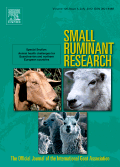
SMALL RUMINANT RESEARCH
Advancing knowledge for better small ruminant management.SMALL RUMINANT RESEARCH is a premier academic journal committed to advancing the field of animal science, specifically focusing on the study and management of small ruminants. Published by Elsevier, this esteemed journal holds a significant standing, ranked in the Q2 category for both Animal Science and Zoology as well as Food Animals in 2023, reflecting its influence and relevance in the academic community. With an ISSN of 0921-4488 and an E-ISSN of 1879-0941, it disseminates high-quality research that encompasses a wide spectrum of topics, including nutrition, genetics, health, and management practices for sheep and goats. Although it does not offer open access, the journal ensures rigorous peer review and publishes articles that aim to bridge research gaps and promote best practices among industry practitioners. With its contribution to knowledge spanning from 1988 to 2024, SMALL RUMINANT RESEARCH serves as an essential resource for researchers, practitioners, and students dedicated to the enhancement of small ruminant production and welfare.
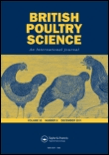
BRITISH POULTRY SCIENCE
Elevating poultry research to new heights.British Poultry Science, published by Taylor & Francis Ltd, is a leading journal dedicated to advancing research in the fields of poultry science, animal husbandry, and food production. With an impressive converged publication history since 1960, this journal serves as a valuable resource for researchers and professionals aiming to enhance the welfare, production, and sustainability of poultry industries worldwide. The journal holds a respectable Q2 ranking in Animal Science and Zoology, Food Science, and Medicine (miscellaneous) for 2023, placing it among the top quartiles of its field. With a Scopus Ranking of #102 out of 490 in Animal Science and Zoology, and a #161 rank in Food Science, it reflects a robust impact factor and relevance in enhancing academic discourse. Although it operates under a traditional subscription model, researchers and students are encouraged to explore the rich compilation of cutting-edge studies and comprehensive reviews that address critical challenges and innovations in poultry science.